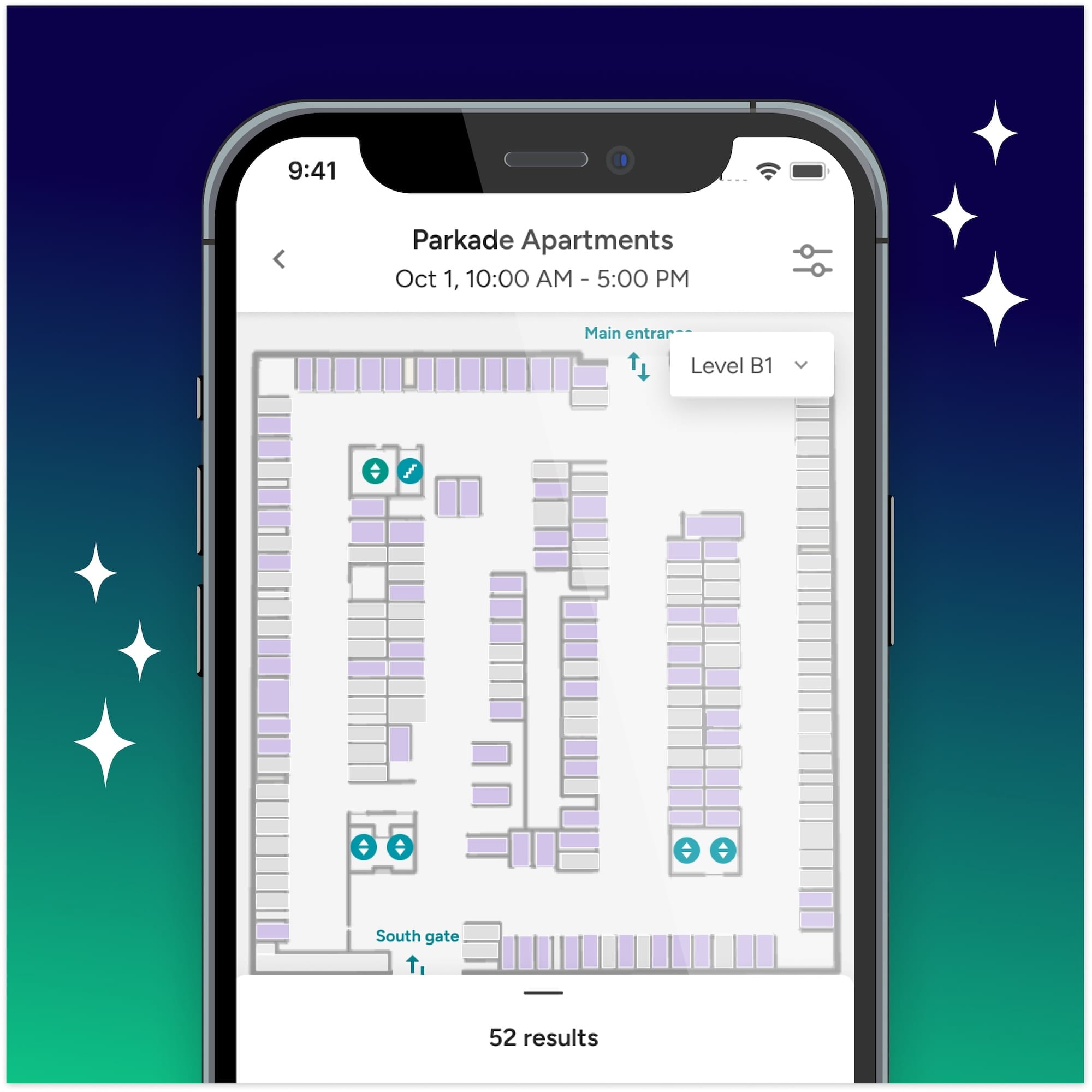

TABLE OF CONTENTS
Apartment complexes across the country are making the switch from bundled parking to paid parking, separating it from the cost of rent. And it’s becoming a more and more popular trend.
Two things are driving this trend.
On the operational side, paid parking helps to better manage demand, increase revenue, and lower the price of base rent, giving properties that unbundle a competitive advantage. But there is increasingly more buzz from residents about the desire to unbundle parking from rent.
A recent study showed that more than 40% of residents surveyed said that they would be receptive to paid parking, stating that it could actually solve some of their key problems, like lack of flexibility in parking options, high rent prices, and low availability of open spots.
All that being said, making the switch from bundled parking to unbundled parking isn’t something you can do hastily. Handling this change in the wrong way can leave you with residents who are confused or angry.
But with a little strategic change management, you can minimize the hiccups and get more residents to buy-in to the value of paid parking more quickly.
We’ve consulted the pros on this one and talked to several property managers who have gone through this transition. They shared some of their best tips for a smooth transition.
Communication with your residents is one of the most necessary pieces of a healthy multifamily operation, but it’s especially critical in moments of transition.
Leaving residents in the dark during these times can lead to serious breakdowns in their relationships with your staff. By keeping them in the loop, residents will be more receptive to changes..
Timing is also important when it comes to communication. Brooke Nuber-Soldate, a multifamily consultant, shared the following advice:
In many cases, existing tenants will already have existing lease terms that cannot be changed — more on that below. But even communities with flexible lease language should tread carefully and give plenty of notice.
Rather than waiting a week or even a month before you implement the change, give your residents at least two months’ time to digest and adapt to the switch to paid parking. During this time, you want to give them clarity on when the change is happening, why the change is happening, and how it will be enforced.
Cover all of your communication channels so that you make it impossible for the news to go unseen by any resident. Send out emails and texts, add signs to elevators and other public spaces on the property, and include reminders with renewals.
When residents suddenly have to pay for a perk that they thought they were receiving for free, they’re initially not going to be thrilled.
It could be easy for them to see this decision as an easy money-grab for the property. That’s why stressing the reason behind the change and the ways it stands to benefit residents is crucial.
The primary thing to stress during this transition is that the parking they were getting before wasn’t truly free. Instead, it was simply bundled into the cost of rent. When you unbundle parking from rent, base rent prices can drop. You could even get residents more excited about the change by sending a message like “Your rent is dropping $100/month on renewal!”
Eunice Lee, a property manager at Fedora x Trillby, shared an example of how much this change can actually lead to more positive perception from not only current residents, but also prospective residents:
“When we unbundled parking, we were able to get our rents under $2,000. That was huge – our tours increased by 30%.” - Eunice Lee, Fedora x Trilby
Some other benefits to highlight to your residents are:
The success of this transition relies heavily on getting your residents to see just how beneficial the switch to unbundled, paid parking will be, so make sure to plan accordingly...
It can be tricky to start charging existing residents for parking. If that’s something you’re considering, as we’ve seen some properties do, step no. 1 is to review your existing lease language.
Always best to consult your legal counsel, but if residents are promised parking a specific price, and the lease doesn’t include language allowing that pricing to change with notice (typically 30 days), you likely cannot unbundle parking until renewal.
The only scenario when you could make the change before renewal is if you had already:
If you’re considering charging existing residents for parking before their existing lease renews, be sure their lease allows the flexibility for that change.
We also recommend meeting with your leasing team, and asking what verbal promises they may have made to existing residents.
One new property, Grant Park, attempted to roll out paid parking, but didn’t get their ducks in a row by the time the building opened, so parking was free for the first few months of lease-up.
While lease language made it clear the community could start charging for parking, management later discovered that some leasing agents didn’t get the message about paid parking plans and verbally promised residents free parking for their lease term. In order to keep residents happy, they delayed their plans for paid parking with existing residents, so be sure to communicate not just with residents, but your own team as well!
Some properties with free-and-clear lease language do choose to proceed with rolling out paid parking with existing residents. However, even if your lease language supports rolling out paid parking with 30-60 notice, changing a policy mid-lease is likely to upset your residents since they feel like you took back something already promised to them.
As a result, many properties choose to take a staggered roll-out approach by implementing unbundled, paid parking only with new residents or upon lease renewal.
To illustrate this with an example, Living at Santa Monica, a new Parkade customer, made the decision to switch to paid parking. Even though we’ve seen many properties convert everyone to paid parking on renewal, to ease this transition, they decided that any residents currently living at the complex will continue to receive parking for as long as they live there. After modeling the switch to paid parking, they found simply charging new residents for parking was sufficient for achieving (and surpassing) their revenue goals.
Brooke Nuber-Soldate shared an example of how she has managed this change in the past, with great results:
“We gave 90 days notice before we implemented the change, and every renewal becomes beholden to the new rules. Every new rental has this in the lease and are notified that this is a transition. Month to month folks had to sign a separate addendum.”
If your existing residents will be affected by these rules, whether after a certain time period or upon renewal, you want to be proactive about ensuring they follow the new rules. Effective enforcement is critical to any changes that you make in parking management.
Property manager Melissa Brown shared the following advice:
“My best advice is communicate a lot in advance and do not be too lenient when people violate. If you prepare them well before the transition and they are fully informed, they will know what to expect and (hopefully) will not give your team too much of a hard time.”
With new residents who are starting their journey with you by paying separately for parking, ensuring rules are enforced is much simpler, since you can set the precedent from the beginning.
Keep in mind that over time, if you continue to give warnings without taking action, residents will be more likely to continue parking without paying. This becomes a slippery slope. If you stick to the rules and consequences that you laid out in your consistent communication leading up to the transition, you will see more residents complying from the beginning.
After you decide to unbundle parking from rent, it’s also imperative to get the pricing right. The right pricing strategy will help you manage demand, stay competitive with communities around you, and keep your residents satisfied.
You also want to make sure that the prices you set for parking and the reductions you make to base rent are in balance. You can do this by setting rules around how much you reduce rent by. For example, for every one bedroom apartment that you were providing 1 free parking spot for previously, if you’ve determined the spot is worth $75, you can reduce base rent by that amount.
There are a ton of moving pieces when it comes to unbundling parking from rent. Especially if your parking is assigned, it can quickly become very cumbersome for a management team to handle spot assignments, process and collect payments, and enforce other rules such as how much parking each unit should receive.
Often, when buildings make this switch without a reliable parking management solution, they struggle to keep up with parking as a rentable item that they didn’t have before, as well issues with maintaining an up-to-date record of who is parking where.
A good parking management solution will help ease all aspects of this transition, giving you both an easy payment system and an always updated system of record in a single system. Systems like Parkade integrate with your PMS to handle everything traditionally done via spreadsheets and rentable items, such as parking assignments, parking rules, and collecting payments. Our solution has helped countless teams seamlessly make the transition from bundled to paid parking, leading to increased satisfaction for both management and residents alike.
Check out our case studies to learn more.
.jpg)
As parking management becomes increasingly digital, security becomes critical — and we’re excited to share that we've achieved a major security milestone.
Read Story
We’re thrilled to announce one of our most significant leaps forward this year: the launch of dynamic maps across our mobile and web applications.
Read Story
Now that AB 1317 is official, it’s time to brush up on the requirements and see how your properties stand to benefit.
Read Story